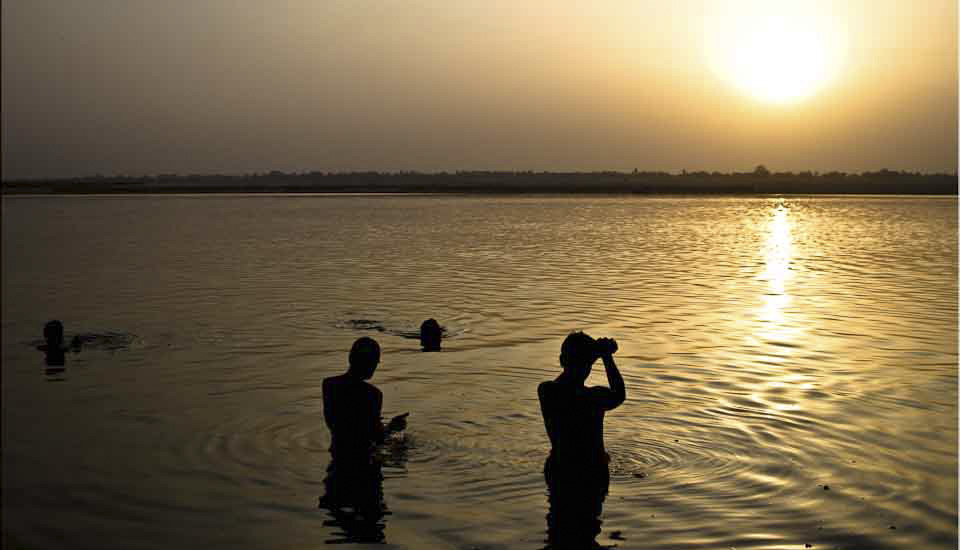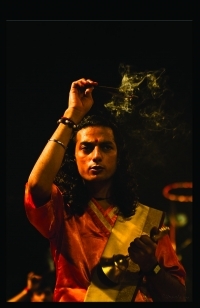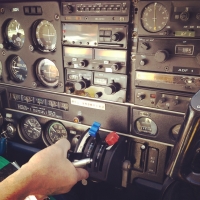.jpg)
Dreamtime Goanna
In Australian Aboriginal Dreamtime stories, totem animals are central. These spiritual animals – like the goanna depicted here by a member of the Excelsior Dance Troupe – are often represented in music, art, and dance.
Australia is home to the world’s oldest living culture.
Indigenous Aboriginal and Torres Strait Islander cultures are complex and diverse, dating back at least 50,000 years. As distinctive as these groups are from each other and from other indigenous populations around the world, they share a number of issues related to maintaining cultural traditions in a modern, changing world. Many of these struggles have related to land rights and self-determination in the face of the arrival of a more dominant group.
According the the Australian government: “… Indigenous communities keep their cultural heritage alive by passing their knowledge, arts, rituals and performances from one generation to another, speaking and teaching languages, protecting cultural materials, sacred and significant sites, and objects.”
In practice, keeping traditions alive and relevant, especially in urban communities, is much more difficult than the official line makes it sound. So, community leaders can learn a lot from each other in forums that allow for the exchange of ideas between aboriginal groups from around the world. This is why cross-cultural festivals, like Boomerang, are so important.
Boomerang, “a New World Indigenous Festival for all Australians”, seeks to provide a space for indigenous artists, thinkers and activists to get together to celebrate culture and share ideas. First held in 2013, the inaugural festival attracted over 5000 attendees who “engaged with the music, art, dance, painting, film, discussion and cultural exchanges of our first nation people from around the world.” It was meant to be an annual event, and we had tickets to attend in 2015, but it lost funding and was cancelled that year.
So, I was excited to hear that – thanks to the collaboration between friends Rhoda Roberts (Director: Boomerang Festival) and Peter Noble (Director: Bluesfest Byron Bay) –Boomerang was to share time and space with Bluesfest Byron Bay 2016.
.jpg)
Arakwal Opening Ceremony
Byron Bay (Cavenbah) has always been an important meeting place for the Arakwal, neighbouring clans who’s ancestors have lived in the Byron Bay area for at least 22,000 years. As part of Bluesfest 2016, Arakwal dancers, musicians and storytellers introduce the broader audience to some local stories.
.jpg)
Arakwal Man Dancing
The dancers perform traditional stories from their heritage: “Our relationship with this Country is more than just a place to live. It’s the living, breathing source of all life, our spiritual home and home of our ancestors’ spirits.”

Arakwal Women Dancing
The Arakwal clan totem is Kabul, the carpet snake, and the women’s totem is the dolphin: both of which can be seen represented in the women’s patterned tights.

East Journey Under Lights
Bridging Aboriginal culture and more modern music, East Journey, from Arnhem Land in the vast wilderness that is the northeast corner of Australia, combine tradition Aboriginal sounds with rock and reggae.

Emma Donovan
Indigenous singer-songwriter Emma Donovan comes from a rich musical tradition: long before she was born, her mother, Agnes Donovan, sang for The Donovans, a band comprised of Agnes’ parents and five brothers. Emma’s uncles continued as the Donovan Brothers band, and she first sang in public with them at age seven. Her cousin, Casey Donovan, the youngest-ever winner of Australian Idol, is know to musical-theatre goers: we saw her recently as Killer Queen in the current run of “We Will Rock You”.
Emma has Naaguja, Yamatji, Danggali and Gumbaynggirr tribal heritage, often writing her songs of urban aboriginal life in the traditional language of the Gumbaynggirr.

Archie Roach
Archie Roach is one of the grand masters of Australian music. He met his future wife, lifelong partner and musical soulmate Ruby Hunter, when they were both homeless teenagers. Both were part of Australia’s infamous ‘Stolen Generation’, having been taken away from their families at an early age. These, and other experiences of being marginalised and living rough, informed their song-writing.
Ruby Hunter died of a heart attack in 2010, aged 54. Archie has survived lung cancer and a stroke to keep on telling the heart-rending stories of his people.

Rako Pasefika
Based in Rotuma, a volcanic island in Fiji, Rako Pasefika is a group of performers with backgrounds as diverse as the island itself. Their singing and dance styles, ukulele playing, log drumming, and traditional chanting draw from the whole region, including Cook Islands, Tahiti, Hawaii, Fiji, Tonga and Rotuma.

Rako Pasefika
Rotuma is at the crossroads of the Micronesian, Melanesian and Polynesian cultures; Rako Pasefika features artists of indigenous Rotuman, Fijian and Pacific Island heritage.

Rako Pasefika
“Rako” literally translates as “to learn” and the group embodies the organic process of Pacific learning through listening, experiencing, collaboration, and exchange.

Rako Pasefika
This collective of artists bring stories of their islands to life through song, music and dance. The recent devastation wrought by Tropical Cyclone Winston and the disastrous effects of climate change featured in their story-telling.

Rako Pasefika
As artisans of the Pacific, they also practice and teach traditional knowledge including bark cloth (Tapa/ Masi) printing, making coconut sinnet (Magi magi) and weaving. These skills are reflected in their costuming.

Jannawi Dancers
Jannawi Dance Theatre is an inner-western Sydney-based company drawing on Aboriginal story-telling traditions as well as urban dance. Their current production showcases the “strength, resilience and beauty of young Aboriginal women.”

Excelsior Dance Troupe
An ensemble fusing modern dance with Indigenous dance, “eXcelsior” members are of Aboriginal and Torres Straight Island descent.

Tenzin Choegyal
Singer-songwriter Tenzin Choegyal creates original music which expresses his cultural heritage in the contemporary context. He opened his set with Safe Passage (which accompanies this post), a prayer-song based on the 8th Century classic text: The Tibetan Book of the Dead. This lament-like song prays for the consciousness to have a safe journey to the next world.

“Little Bird”
In his song, “Little Bird”, Tenzin asks a bird to carry a message of hope to his birthplace, Tibet. Born to a nomadic family, Tenzin escaped the Chinese occupation with his family in the early 1970s and grew up in a Tibetan refugee community in Dharamsala, India. He came to Australia in 1997, with little more than his lute-like Dranyen and his passion for communicating through music.

Rako Dancers
On the last day of the festival, I rejoined the Rako Pasifika to enjoy their enthusiasm, …

Rako Dancer
… their grace, …

Rako Dancers
… their power, …

Rako Dancer
… and their beauty.

Rako Dancers and Musicians

Rako Dance Lesson
After they finished their performance, the musicians and dancers of Rako Pasifica invited the audience to learn one of the dances and it’s meaning.

Girls in the Middle
A lot of people gave it a try, but it was the joy on the young participants’ faces that gave me hope…

Girls Learning
… for it is activities like this that allow the ongoing learning and sharing of cultural traditions.
I have mixed feelings about how well the two festivals integrated: it was wonderful to see many top-notch Indigenous artists on the Bluesfest main stages, and it was great to be able to drop in and out of Boomerang activities, but I can’t help wondering if the Boomerang performances were not overshadowed by the bigger names near by, and if the serious discussions that were part of the schedule were not made more difficult by the booming sounds of mainstream music. I also felt sorry for the dancers who continued in the pounding rains, while I – and many, many other festival-goers – crowded under the tent awnings to escape the elements.
Even so, I certainly took many good things away from what little I saw, and I hope the participants did also.

“Music expresses that which cannot be said and on which it is impossible to be silent.”
– Victor Hugo
Pictures: 24-28March2016





























.jpg)


[…] Tenzin Choegyal It doesn’t get much more international – or gently political – than a displaced Tibetan singing plaintive stories of longing for his lost homeland. Tenzin Choegyal’s voice made the hairs on the back of my neck stand up; his stories brought tears to my heart. (For a sound clip, visit: Boomerang Festival.) […]
[…] tells heartbreaking stories of displacement. Attached to last year’s post on the the Boomerang Festival, I shared his lament, ‘Safe Passage’, a prayer-song based on the 8th Century […]
[…] as I can fit into my broader festival experience: I always sample some of the music and dance (eg: Boomerang 2016; Back to the Roots; Australian Guitars and Strings; Blues Women Rock; Songs of Joy and […]